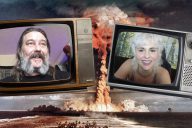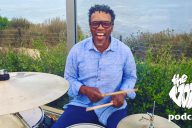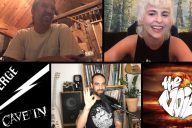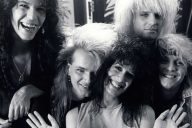Greg Puciato on Dillinger Escape Plan, Solo, Psychedelics, Killer Be Killed & Alice in Chains Bootcamp
By christina · On November 20, 2020Greg Puciato is a transcendent mood. Several years since he climbed his last rafter with the explosive Dillinger Escape Plan via a series of shows in the band’s native New York, his output has been mightily prolific. From The Black Queen, a darkwave Depeche Mode-esque group, a poetry book that delves deep into his darkest years, his first solo album and shows with Jerry Cantrell of Alice In Chains performing the formidable parts first laid down by the gloriously raw Layne Staley, Puciato has been creating like it is crucial to his very survival. The long-awaited second album from Killer Be Killed, his project alongside Max Cavalera, aggressively talented drummer Ben Koller (Converge) and Mastodon’s Troy Sanders is yet another new frontier for the vocalist who first took the microphone after Henry Rollins in Dillinger Escape Plan. In an expansive two hour podcast, we cover enormous ground.
On creative freedom:
Greg: “There’s nothing stopping me from doing anything I want, between The Black Queen, Killer Be Killed, solo stuff and collaborations behind the scenes that are happening that I can’t even talk about … once touring gets re-added back into that, the full picture of my life is going to be exactly what I want it to be at 40 years old.
On the prospect of a Dillinger Escape Plan reunion:
Greg: If we ever do decide to do Dillinger Escape Plan – to fade that back into our lives – we can do it from a standpoint of being fully formed. So that we can control how much space that thing takes up in our life … you know, once you become the full adult version of you, where you see the bigger picture of your life, then maybe you can let that thing back into the room and let it take up a more balanced space for everyone. Or maybe not, you know, yeah, that’s not a discussion that we’ve even had.
I didn’t really enjoy the final few years of the Dillinger Escape Plan … your life is this fucking weird fishbowl existence; travelling around in this bubble. You’re not growing outside of the bubble, because you’re just in this day-to-day loop of insanity. Your life is so different from a normal person’s life. So you’re developing psychologically much slower than a normal person would in some areas, but much faster in other areas, because you have this heightened, crazy existence.
And, you know, I think that we all got to the point behind the scenes where we were dealing with so much stuff that we weren’t able to handle because of the size of the thing that was taking up all the space in the room. By the time we really called it a day, we needed that thing to go away, because we couldn’t actualise as individuals with that thing still in the room.
In the end, you could feel that inside and it causes panic and anxiety and depression because the alarms are going off in you for the things that you’re not doing, the things that aren’t happening and the things that you’re missing out on.
Whether it’s for me, artistic and creative, or other people might be like family and things like that, the things that you’re not doing and the parts of your life that you’re not missing in the developmental stages that you’re not going through, those alarms are becoming louder than the excitement that you have for the thing that’s keeping you from doing all those things.
Now, we can look back at it and be like, that was fucking cool. Now, it’s always a part of me. Like I said to someone else the other day, it’s like you’re Bill Murray and all you want to do is fucking stop talking about Ghostbusters. You spend all this time just trying to get away from Han Solo or Ghostbusters. And then at some point, you can do that … because you need to be able to come back to it from a position of you own it, it doesn’t own you.
… Once you become the full adult version of you, where you see the bigger picture of your life, maybe you can let that thing back into the room, and, and kind of let it take up a more balanced space for everyone. Or maybe not, that’s not a discussion that we’ve even had … it’s like, in five, three or four or 10 …. however many years, can you let it be, “Oh, they can do this a few times a year or something?” Yeah, you will see. Who knows?
On creating only in an extreme emotional state:
Greg: I don’t write unless I’m in an extreme state. Most people that are emotionally stable live between 0 and 10. And they primarily live between like four and seven. I feel like I live between -5 and 15. I try to not write unless I’m in -5 to 0 or 10 to 15. You know, art is the abstract expression of your emotion and your soul, right? That’s all art is, it doesn’t matter. You’re not a guitar player, you’re not a singer, you’re an artist, and whatever tool that you have in front of you, that’s the thing that you’re using to channel this abstract expression. By the time it gets translated to people, it waters down naturally. So, if you want an idea to hit them at 10 you have to be at 15. Or if you want it to feel depressing to a normal person and you want it to be zero, you have to fucking write it when you’re suicidal, like negative five.
On Killer Be Killed’s band members and the way drums lead vocals:
Greg: We’ve intersected in really weird ways along life. If you stay on the track that you’re supposed to be on, you just keep getting all these weird signposts and things tying in from other times of your life. So you have someone like Max [who I’ve] been friends now for like a decade. This is a guy who when I was 10, or 12, or 13 years old, I was listening to his band. And Troy and Ben were too. But then Troy, Ben and I were friends at like, 22 years old. So we have different intersections.
On the role of rhythm in making music with Killer Be Killed and Dillinger Escape Plan:
Greg: Well, I’m very rhythmic as a person. I’m very drummer-oriented. Before I started playing guitar at nine, my mom told me when I was like three or four that I had this little drum set that I was obsessed with, that I just played it all the time. It might be from growing up in Baltimore, where there’s a lot of African American culture and a lot more of a rhythmic element to that music than then then a lot of other forms. Being in Dillinger for so long, that band is primarily rhythmic – even [the] guitar playing is mostly rhythmic. Obviously, the drums … a lot of the things that you would consider a riff is a rhythm. So like, you know, I became fused to rhythm in a lot of ways.
On performing Layne Staley’s parts with Alice in Chains’ Jerry Cantrell:
I was right in the middle of tracking my record last October. So we were in the thick of it. That’s when [Jerry] Cantrell hit me up and was like, I’m going to do solo stuff and Alice In Chains stuff. Do you want to sing the Layne parts and the harmonies? [Layne Staley] is one of the greatest rock stars of all time … I really felt the weight of that energy and that spirit in those fucking moments. There was a moment in one of those shows that I just became overwhelmed with like, this fucking emotion. I started crying during the song in a way that I’ve never felt before. I felt so overwhelmed with that person’s energy that had been infused into these songs. It really felt like there was like this presence in the room. But from a physical standpoint, like the harmonies and everything, I learned a lot. I’ve never had to work that closely with another vocalist before. And he’s a pitch perfect singer. When we left it and I went back to recording vocals, I immediately did my [solo] album and then Killer be Killed, back to back.
Interview extracts have been condensed for brevity. Listen to the full podcast on YouTube.







No Comments